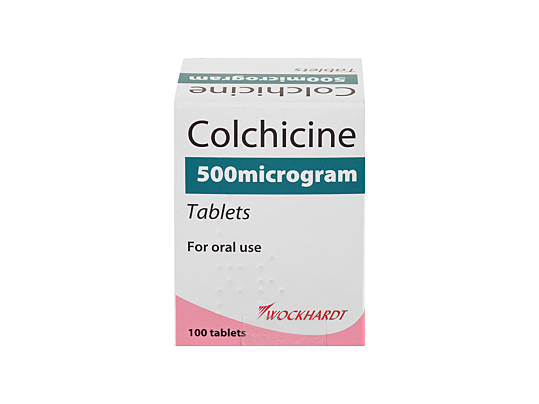Gout Treatment
Get gout treatment online with free and fast delivery.
Prices from £24.95
To request a treatment, fill in a brief medical questionnaire. A doctor will review your answers and prescribe treatment if it’s right for you. For test kits, you can just place an order. Once you’ve sent your sample to our UK-accredited partner laboratory, results and advice from our doctors will be ready in 2 to 3 days.
Gout is a type of arthritis that affects one or more joints, making them swell up. It’s caused by too much uric acid in your blood.
A gout attack can be very sudden and painful. It can affect the hands, wrists, elbows, knees, and feet, but is most common in the big toe.
In the UK, about 1 in 40 people have gout, and it is more common in men than women.
You can easily test for gout at home, and can get a test kit and repeat treatment if you have already been diagnosed with gout online from ZAVA.
Gout test and treatment
In stock. Prices from £24.95

No results found.
Please check your spelling or try another treatment name.



Key facts about gout
- Gout mostly affects the big-toe joint
- It’s more common in men than women
- 1 in 40 people in the UK have gout
- Children do not usually get gout
How to test for gout
- You should test for gout if you’ve had sudden severe pain, redness, and swelling in any of your joints, lasting up to 10 days
- The best time to test for gout is at least 4 weeks after you’ve had symptoms, to get accurate results
- You can test for gout using our home blood-test kit, or by booking an appointment with your GP
- If you’re having symptoms right now, for the first time, it’s best to see a GP about it in person, so they can make sure it’s not a more serious condition that is causing the joint to swell
How to treat gout
- Medicines like ibuprofen, colchicine, and steroids are used to treat gout
- You can reduce the pain in your joints by raising the affected leg and using ice packs to cool the joint down
- Lifestyle changes like exercise, eating a healthy diet, and avoiding certain food and drinks, can help prevent future gout attacks
-
-
Gout mostly affects the big-toe joint, but can also be found in other joints in the hands, arms, and legs.
Gout attacks happen suddenly and can be very painful. They can sometimes be mistaken for other causes of joint pain like osteoarthritis, but some symptoms are very specific to gout. These include:
- red, hot, and swollen skin around the affected joint
- sudden and severe pain in any joint that develops over a few hours, lasting up to 10 days
- being unable to move the joint as you used to
-
-
Gout is caused by too much uric acid in the blood. Uric acid is a chemical the body makes when it’s breaking down another chemical called purines. Purines are found naturally in the body, and are also taken in from what we eat and drink.
We normally get rid of uric acid when we pee. But too much of it in the blood can cause crystals to form. These crystals surround the joints and irritate them, causing pain and swelling.
Uric acid can build up in the body for different reasons. Some people have problems with their kidneys and are not able to pass out enough uric acid compared to the amount their bodies are making. Others may be at risk of having gout if they:
- have medical conditions like high blood pressure, blood disease, diabetes, or obesity
- take medicines like aspirin or water tablets (diuretics), or are having chemotherapy
- drink too much alcohol
- do not have enough vitamin C in their diet
- eat a lot of food that is high in purines, like red meat and seafood
- have a lot of sugary drinks and fruit juices
-
-
You should wait at least 4 weeks after having any symptoms of gout before testing for it. This will make sure that the results are accurate.
You can also do the test if you have not had symptoms but are concerned that you might have gout.
You can buy one of our home blood-test kits for gout, or book an appointment with your GP.
In order to test for gout we will need a small sample of blood which you can get from a finger prick using our home test kit. We will use this to check your uric acid levels. We have outlined the process below in 5 easy steps:
Using a home test works in the following steps:
- Place an order and get your kit delivered to your door, or collect from a local post office (delivery is free)
- Collect a few drops of blood using a finger-prick test
- Send your samples to our UK-based, accredited partner laboratory (postage is free)
- Once your results are available (in 2 to 3 days), our doctors will review your results
- One of our doctors will contact you, via a secure and confidential message in your patient account, to let you know your results and give you advice and support on what to do next
In some cases, the doctor may need to ask for more information. They may contact you by phone, so make sure your telephone number is up to date in your online account.
Testing at your GP
If you think you have gout, you can book an urgent appointment with your GP who may:
- ask questions about your diet
- ask about any medical conditions you have, or medicines you currently take
- use a thin needle to take a fluid sample from any swollen joints to test for uric acid
- send you for a blood test, x-ray, or ultrasound
- discuss treatment options with you
-
-
Medicines like ibuprofen and colchicine are used to treat and control gout attacks. If things do not get better after 3 to 4 days of taking these, you may be treated with steroid tablets or injections.
Other things you can do to ease the pain during a gout attack are:
- raise the affected body part
- use ice packs on the affected areas to help cool down the swollen joints
- drink plenty of water
There is currently no permanent cure for gout, but you can help prevent future gout attacks by making the following lifestyle changes:
- Maintain a healthy weight, and eat a balanced diet
- Drink plenty of water daily
- Do not drink more than the recommended amount of alcohol
- Exercise regularly – aim for 30 minutes, 5 times a week
- Cut down or stop smoking
- Avoid sugary drinks, and foods with a lot of purines in them
- Take a vitamin C supplement
-
-
How does colchicine work?
Colchicine tablets are used to treat gout in two ways:
- To treat sudden gout attacks
- To prevent gout attacks when combined with other medicines
Colchicine works by stopping your body’s white blood cells from attacking the uric-acid crystals in your joints. This helps to lower swelling and pain.
How do you take colchicine?
To treat gout attacks:
- Take 1 tablet up to 4 times a day until your pain has stopped, or until you have taken a total of 12 tablets (from when the attack started)
- Do not take more than 4 tablets in a day
- Do not take more than 12 tablets in 1 course of treatment
- Once you’ve finished a course, do not take a tablet again for at least 3 days
To prevent gout attacks:
- Usually, 1 tablet is taken twice a day for up to 6 months
If you’re taking colchicine, you should not eat grapefruit or drink grapefruit juice. The chemicals in the fruit affect the way your body takes in the drug.
What are the side effects of colchicine tablets?
If you experience any of these side effects, stop taking the medication and contact a doctor.
- Common side effects:
- Feeling sick (nausea)
- Being sick (vomiting)
- Pain in your tummy
- Diarrhoea
Less common side effects:
- High temperature (fever)
- Swelling and irritation in the mouth
- Sore throat
- Bleeding
- Bruising or skin problems

Dr Clair Grainger studied at The University of Edinburgh from 2004 to 2009. She's worked in hospitals throughout Edinburgh and London before completing her GP training in North Middlesex Hospital in 2017.
Meet our doctorsLast reviewed: 24 Sep 2019
-
Arthritis Foundation (2019). Gout. [online] Available at: https://www.arthritis.org/diseases/gout [accessed 4th September 2019].
-
EMC (2019). Colchicine 500 micrograms Tablets. [online] Available at: https://www.medicines.org.uk/emc/product/6415/smpc [accessed 4th September 2019].
-
Kuo C, Grainge MJ, Mallen C, et al (2015). Rising burden of gout in the UK but continuing suboptimal management: a nationwide population study. Annals of the Rheumatic Diseases 74:661-667 Available at: https://ard.bmj.com/content/74/4/661 [accessed 4th September 2019].
-
National Health Service (2017). Gout. [online] Available at: https://www.nhs.uk/conditions/gout/ [accessed 4th September 2019].
-
Patient.info (2017). Gout. [online] Available at: https://patient.info/foot-care/gout-leaflet#nav-2 [accessed 4th September 2019].






